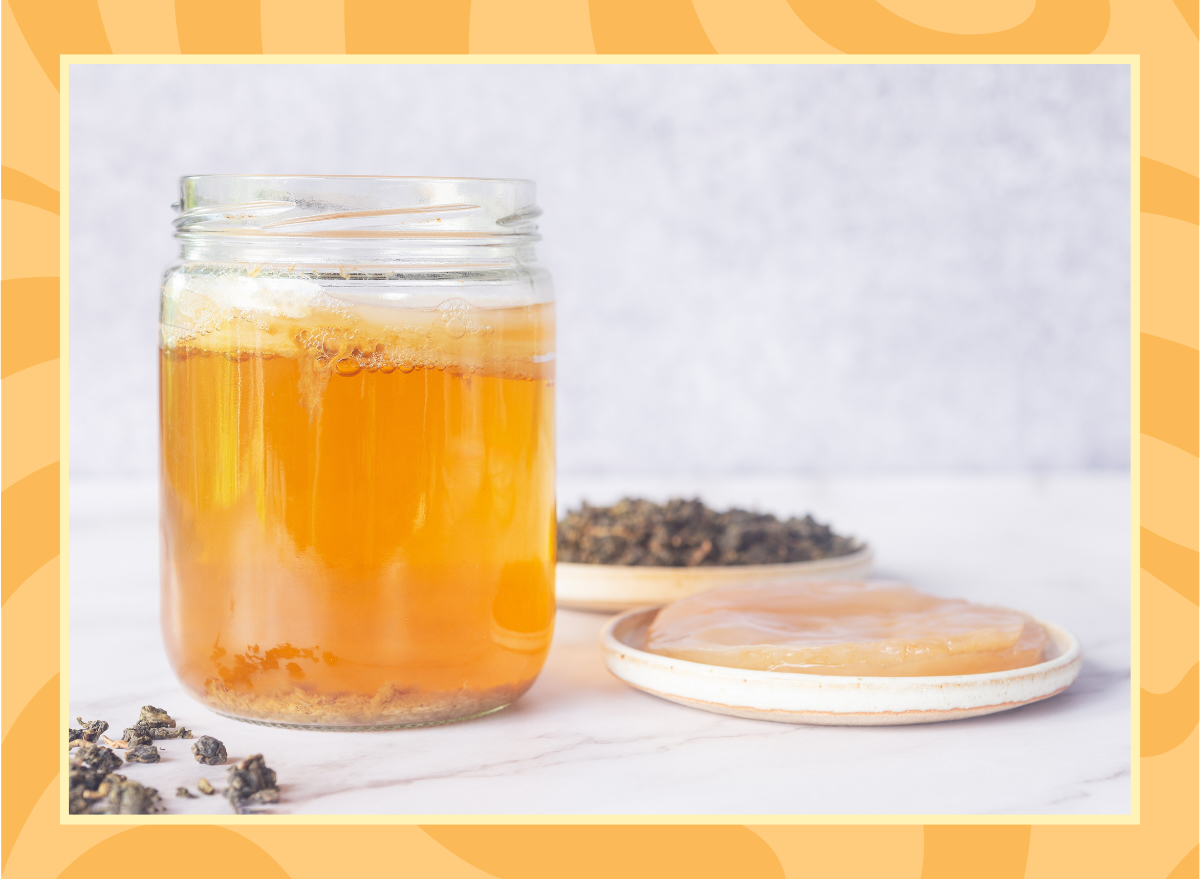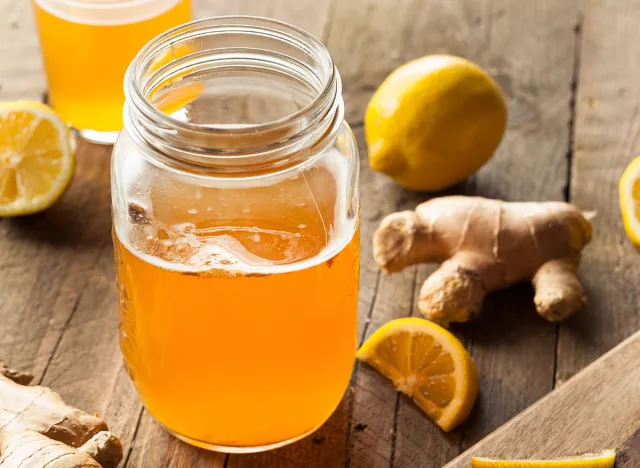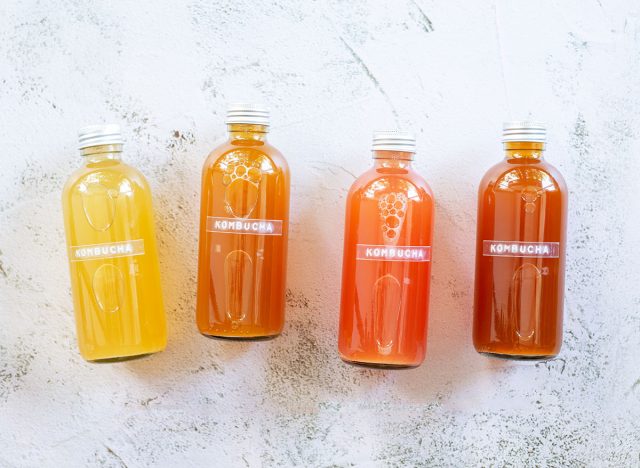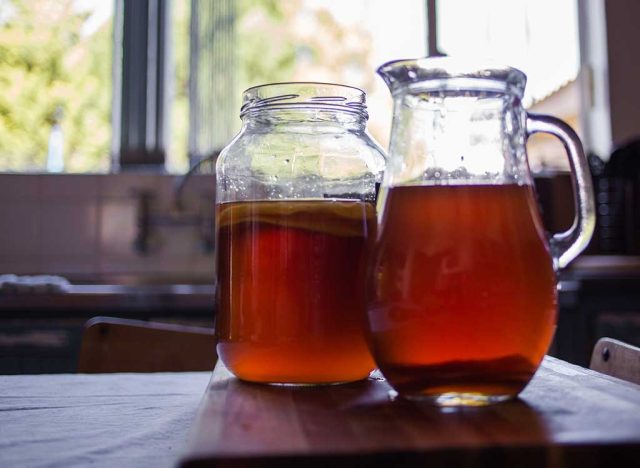What Drinking Kombucha Every Day Does To Your Body

With the rising demand for functional beverages that both taste great and provide added health benefits, grocery coolers are now stocked with healthier soda alternatives like prebiotic sodas, kefir water, and, of course, kombucha. While kombucha is an ancient beverage with origins dating back to 220 B.C., its popularity has grown exponentially in recent years. Today, you'll find dozens of brands and endless flavor combinations in well-stocked grocery stores. And the trend isn't slowing down—the kombucha industry is expected to grow from $1.8 billion in 2024 to $6.2 billion by 2032.
But before you start drinking kombucha every day, it's important to get the facts straight. Despite its long history, many claims about kombucha's health benefits are anecdotal and lack scientific evidence. While most people can enjoy an occasional glass of kombucha without concern, making it a daily habit might require more consideration.
As a dietitian who loves treating myself to a fizzy ginger kombucha and has even experimented with making my own at home, I dug into the research to see what the science tells us about kombucha's health benefits and reasons you may want to avoid or limit this bubbly fermented drink. Read on, and for more insights, don't miss I Drank Kombucha for 30 Days & Experienced 3 Life-Changing Benefits.
In This Article
- What Is Kombucha?
- Kombucha Nutrition Facts
- Benefits of Kombucha
- Potential Drawbacks of Kombucha
- Conclusion: Is Kombucha Good for You?
What Is Kombucha?

Kombucha is a fermented tea made by combining either black or green tea with sugar and a SCOBY (Symbiotic Culture of Bacteria and Yeast). If you've never seen a SCOBY, it's a disc-shaped blob that feels like jelly and floats on top of your fermenting kombucha. While it doesn't look especially appealing, this SCOBY is what helps transform regular tea into a sweet, tangy, fizzy drink that's rich in probiotics.
To keep the probiotics active and intact, most kombucha is sold and consumed without being pasteurized, which is usually fine for healthy individuals but could pose potential concerns for children or those with weakened immune systems.
Kombucha has been enjoyed for centuries as a home-brewed beverage, but its growing popularity has led to a surge in commercial production. Today, you can easily find raw, unpasteurized kombucha at most well-stocked grocery stores.
Kombucha Nutrition Facts
The exact nutrition found in a bottle of kombucha depends on the brand and type of ingredients used. However, most will provide somewhere close to this:
Calories: 60
Fat: 0 g
Sodium: 7 mg
Carbs: 15 g (Fiber: 0 g, Sugar: 15 g)
Protein: 0.3 g
Kombucha typically contains 40–50 milligrams of caffeine, as it's made with tea. During the fermentation process, natural yeasts convert sugars into small amounts of alcohol—usually less than 0.5%. However, the alcohol content can be higher especially in home brews where it's not as closely tested.
Most kombucha provides negligible amounts of vitamins and minerals, but adding fruit juice can boost its nutrient content, offering small amounts of vitamin C, vitamin E, B vitamins, potassium, iron, and magnesium.
Benefits of Kombucha

It's a natural probiotic
One of the most widely sought-after benefits of kombucha is its natural probiotic content. Since it's made by fermenting yeast and bacteria, kombucha is filled with live, active cultures that can help support a healthy gut microbiome.
Many brands on store shelves advertise a billion CFU (colony-forming units) of live and active probiotics in each bottle. While this may be true at the time of bottling, it's common to have probiotic counts decrease as time goes on. A March 2023 study in Beverages found that just 16.3% of soft or soft-aberrant (alcohol content exceeding 0.5%, but not considered "hard") contained a billion CFU of live and active probiotics when tested. The species of bacteria you'll find is also very diverse. Given the variety of microbe types and the amount you'll find in a bottle of kombucha, it may promote a healthy gut but is not a therapeutic option to help with specific symptoms or conditions.
It's high in antioxidants
Since kombucha is a fermented tea, made most often with black or green tea, it's a good source of antioxidants and polyphenols. These compounds help to fight free radicals in the body, helping to reduce oxidative stress and reduce inflammation. Some research has found that kombucha brewed with green tea has the highest phenolic content, and the fermentation process may increase some of these beneficial compounds available by drinking kombucha.
It may lower your risk of diabetes
Since one of the few ingredients used to make kombucha is sugar, it's not a sugar-free drink. However, much of the sugar added is used in the fermentation process, with varying amounts of sugar left behind.
But, the small amounts of sugar in kombucha may not be as detrimental to your blood sugar as you might think. A 2023 study found that drinking kombucha with a meal lowers the postprandial glycemic and insulin response 120 minutes after eating compared to soda water or diet soda. The mechanism behind kombucha's effect on insulin sensitivity and the body's response to glucose isn't exactly known, but scientists believe it's a combination of kombucha's pH, microbial content, organic acids, polyphenols, and tannins.
It may reduce the risk of heart disease
The high antioxidant content found in kombucha may also support a healthy heart and cardiovascular system. Various animal studies have found that kombucha tea may lower LDL cholesterol and increase HDL cholesterol, supporting more favorable blood cholesterol levels. These findings may be related to the beneficial effect kombucha has on the gut microbiome and oxidative stress, but it's not yet clear how kombucha impacts cholesterol levels in humans.
Potential Drawbacks of Kombucha

It could upset your stomach
While many people can occasionally (or even routinely) drink kombucha without any digestive side effects, that's not the case for everyone. The combination of acidity and carbonation from the fermentation may lead to discomfort or bloating in people with sensitive stomachs or who have acid reflux or IBS. If you're unsure of how kombucha will impact your digestion, try just a small serving at first and stop drinking if it worsens any digestive symptoms.
If you have a compromised immune system, it could make you sick
Like most probiotic foods and drinks, kombucha has the biggest probiotic benefit when you drink it raw and unpasteurized. Unfortunately, the lack of pasteurization, which keeps more beneficial bacteria intact, also means a higher risk of consuming harmful bacteria. While the risk is small, people who have a compromised immune system and children should avoid drinking raw kombucha.
It's not great for your teeth
Drinking acidic beverages increases the rate of enamel demineralization and tooth erosion. Kombucha is about as acidic as cola and can be just as damaging to your teeth if drank regularly. To help minimize these effects, you can drink kombucha from a straw so it has less interaction with your enamel, and make sure to rinse your mouth out with water after drinking or brush your teeth.
Conclusion: Is Kombucha Good for You?
Kombucha can be a delicious and refreshing drink with nutritional benefits that go beyond a typical soda. Whether brewed at home or bought from the store, it naturally provides probiotics and antioxidants, supporting gut health and helping your body fight oxidative stress.
Despite the numerous potential health benefits, kombucha is far from a miracle drink or a cure-all. If you are immunocompromised, have IBS or acid reflux, or are worried about enamel erosion, you'll want to drink it with caution.
- Source: https://www.sciencedirect.com/science/article/abs/pii/B9780081005965030328
- Source: https://fdc.nal.usda.gov/food-details/2710509/nutrients
- Source: https://www.mdpi.com/2306-5710/9/3/59
- Source: https://www.researchgate.net/publication/361313023_All_aspects_of_antioxidant_properties_of_kombucha_drink
- Source: https://pmc.ncbi.nlm.nih.gov/articles/PMC9982099/
- Source: https://www.researchgate.net/publication/267249196_The_effect_of_feeding_fermented_kombucha_tea_on_HLD_LDL_and_total_cholesterol_levels_in_the_duck_bloods









